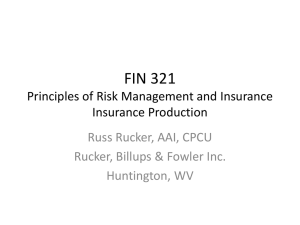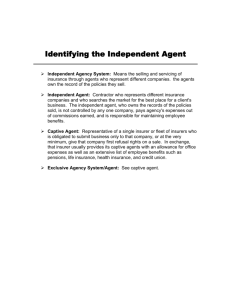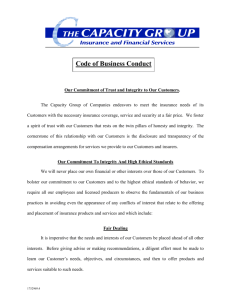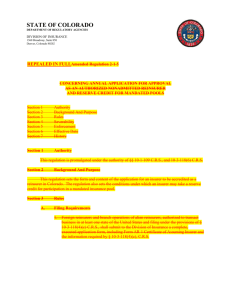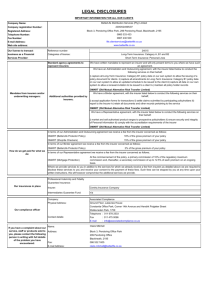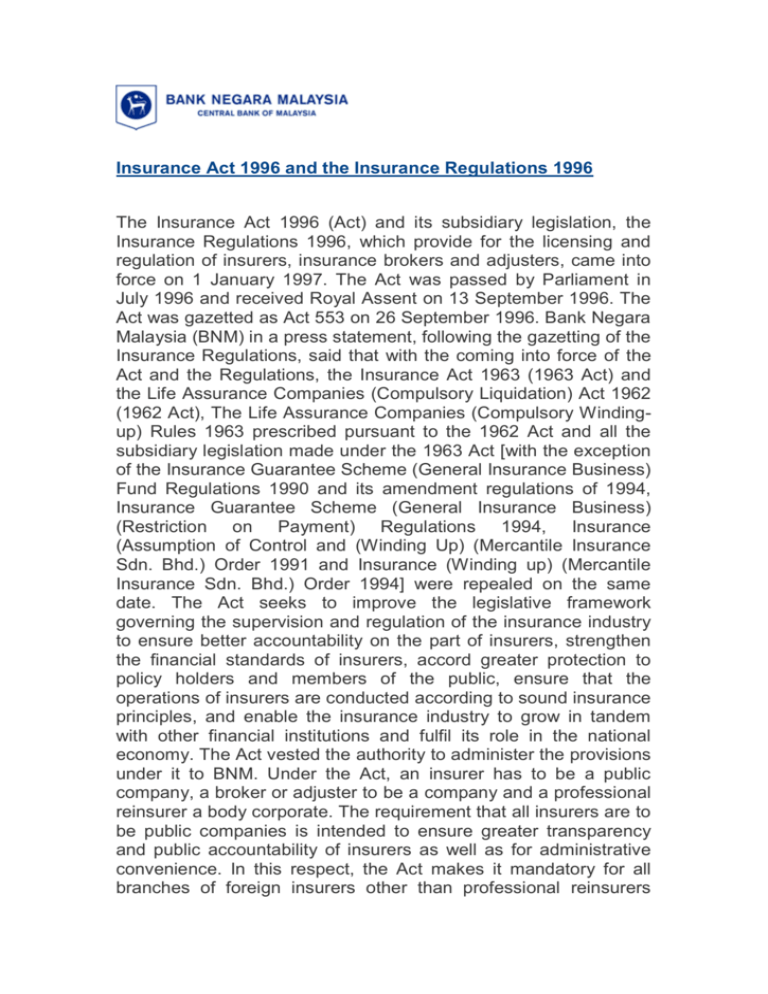
Insurance Act 1996 and the Insurance Regulations 1996
The Insurance Act 1996 (Act) and its subsidiary legislation, the
Insurance Regulations 1996, which provide for the licensing and
regulation of insurers, insurance brokers and adjusters, came into
force on 1 January 1997. The Act was passed by Parliament in
July 1996 and received Royal Assent on 13 September 1996. The
Act was gazetted as Act 553 on 26 September 1996. Bank Negara
Malaysia (BNM) in a press statement, following the gazetting of the
Insurance Regulations, said that with the coming into force of the
Act and the Regulations, the Insurance Act 1963 (1963 Act) and
the Life Assurance Companies (Compulsory Liquidation) Act 1962
(1962 Act), The Life Assurance Companies (Compulsory Windingup) Rules 1963 prescribed pursuant to the 1962 Act and all the
subsidiary legislation made under the 1963 Act [with the exception
of the Insurance Guarantee Scheme (General Insurance Business)
Fund Regulations 1990 and its amendment regulations of 1994,
Insurance Guarantee Scheme (General Insurance Business)
(Restriction on Payment) Regulations 1994, Insurance
(Assumption of Control and (Winding Up) (Mercantile Insurance
Sdn. Bhd.) Order 1991 and Insurance (Winding up) (Mercantile
Insurance Sdn. Bhd.) Order 1994] were repealed on the same
date. The Act seeks to improve the legislative framework
governing the supervision and regulation of the insurance industry
to ensure better accountability on the part of insurers, strengthen
the financial standards of insurers, accord greater protection to
policy holders and members of the public, ensure that the
operations of insurers are conducted according to sound insurance
principles, and enable the insurance industry to grow in tandem
with other financial institutions and fulfil its role in the national
economy. The Act vested the authority to administer the provisions
under it to BNM. Under the Act, an insurer has to be a public
company, a broker or adjuster to be a company and a professional
reinsurer a body corporate. The requirement that all insurers are to
be public companies is intended to ensure greater transparency
and public accountability of insurers as well as for administrative
convenience. In this respect, the Act makes it mandatory for all
branches of foreign insurers other than professional reinsurers
operating in the country to be incorporated locally by 30 June
1998. This requirement has also been incorporated into the
Schedule of Commitments under the General Agreement on Trade
in Services and reflects the Government's intention that branches
of foreign insurers operating in the country should demonstrate a
more direct and permanent financial commitment to the
development of the nation. The Act empowers BNM to prescribe
by way of regulations the minimum amount of capital to be
maintained by an insurer and in the case of a foreign insurer
operating as a branch, a surplus of assets over liabilities in
Malaysia. The imposition of a minimum capital requirement is
intended to build up the financial strength of insurers to enable
them to take a proactive approach to service the insurance needs
of the country effectively and eventually to compete with regional
and international players. The greater financial commitment on the
part of shareholders is also expected to drive the insurers to
perform better so as to improve or at least maintain the rate of
return to their shareholders. The prescribed minimum capital
requirement for an insurer ranges from RM20 million to RM100
million depending on the type of insurance business the insurer
transacts. An insurance broker and loss adjuster is also required to
maintain a minimum paid-up share capital unimpaired by losses of
RM500,000 and RM150,000 respectively. The increase in
minimum capital requirements will be implemented in stages to
give licensees time to comply. BNM is also empowered under the
Act to prescribe the amount and manner in which the solvency
margin of an insurer will have to be maintained. In line with the
increase in minimum capital requirement, the minimum solvency
margin as prescribed has been increased from RM5 million in the
1963 Act to RM50 million for each class of business. At the same
time, additional criteria have been introduced, linked to claims in
the case of general insurance business, and net liabilities and
sums at risks, in the case of life insurance business. The assets
backing the solvency margin are also required to be in the form of
assets specified by BNM. BNM seeks to prevent the dishonest, the
incompetent and the inexperienced from occupying positions of
power and influence in the licensee. In this respect, the Act makes
it necessary for a person to secure the approval of the Minister of
Finance (in the case of an insurer) or BNM (in the case of an
insurance broker or adjuster) if he wishes to enter into an
agreement or arrangement to acquire or dispose of any interest in
the shares of the respective licensees or their controllers if the
acquisition or disposal in aggregate exceeds five per cent of the
shares of the licensee or of its controller. Previously this
requirement was imposed administratively. The 1963 Act prohibits
a person from insuring its property located in Malaysia or ship or
aircraft registered in Malaysia with a person other than with an
insurer registered under the 1963 Act. Under the Act, this
requirement has been extended to insurance of liability of a person
resident in Malaysia to a third party. The aim of this provision is to
prevent an unnecessary outflow of premiums from Malaysia and,
at the same time, build up local expertise for such type of
business. There are several provisions in the Act aimed at
facilitating a policy owner in his dealings with a life insurer. Section
148 allows a policy owner to return a policy within 15 days after its
delivery to him without having to give any reason and the life
insurer has to refund the premium subject only to the deduction of
expenses incurred for a medical examination. Previously, to return
a policy, the policy owner has to object in writing to any of the
terms and conditions of the policy. A person who solicits or
negotiates a contract of insurance is deemed under the Act to be
an agent of the insurer for the purpose of the formation of the
contract and his knowledge or action is deemed to be the
knowledge or action of the insurer unless there is collusion
between the insurance agent and the proposer. As such, any
statement made or act done by an agent is deemed a statement or
act done by the insurer. The Act also provides that a policy owner
who surrenders a single premium life policy at any time after its
inception or in the case of any other life policy after it has been in
force for three years or more is entitled to receive the surrender
value for that policy. Previously, the payment of a surrender value
for a single premium life policy is at the discretion of the life
insurer. Provisions to promote expeditious claims settlements by
insurers in respect of policy moneys under a life policy or death
claims under a personal accident policy have also been
incorporated into the Act. The new law empowers a policy owner
to nominate a person to receive the policy money upon death of
the policy owner and allows the insurer to pay the full amount of
the policy moneys to the nominees without him (the nominee)
having to produce a Grant of Probate or Letters of Administration
or Distribution Order. Section 161 of the Act also requires an
insurer to pay a compound interest of not less than four per cent
per annum on the amount of life insurance or personal accident
death benefit not paid upon the expiry of 60 days from the date of
receipt of the claim intimation until the date of payment of the
claim. Since the raison d'etre for insurance supervision is the
protection of policyholders' interests, most of the provisions in the
Act contain the protection element. Towards this end, the Act
provides that an insurance contract entered into based on a
misleading statement or fraudulent concealment of a material fact
by an insurer or its agent or by the use of unauthorised sales
illustration by an insurance agent is voidable on the part of the
policy owner. The Act also prohibits any person including an
insurance broker licensed under the Act to act on behalf of an
insurer not licensed under the Act except with the approval of
BNM. In addition, the use of the word "insurance", "assurance",
"underwriter "or any of its derivatives is restricted to a licensee and
to a person who had obtained the prior written approval of BNM.
This is to avoid the possibility of any member of the public being
misled by a person (using such terms) that he is carrying on a
licensed business under the Act. This prohibition does not apply to
a person who appends to his name an insurance qualification
conferred on him by a prescribed body, an insurance agent
registered with the Life Insurance Association of Malaysia or
General Insurance Association of Malaysia and an association of
licensees or association of employees of licensees. The Act also
stipulates certain requirements to be fulfiled on the part of a
proposer for insurance for his policy to be enforceable. This
include among others provisions requiring a proposer to fully
disclose to the licensed insurer relevant information pertaining to
the risk being insured as well as ensuring that insurable interest
exists in the life of a person on whom the insurance is effected and
that the amounts under the life policy does not exceed the
insurable interest. The subsidiary legislation made and all
executive acts done under the repealed 1963 Act will be deemed
to have been made in accordance with the corresponding
provisions of the Act as provided under section 214 of the Act.
Such subsidiary legislation and executive acts, therefore, will
remain in full force and effect until amended, repealed or replaced.
Similarly, every guideline, circular or notice issued by BNM before
the coming into force of the Act are deemed to have been issued
under section 201 of the Act and will therefore remain in full force
and effectuntil amended or replaced under the Act. In addition, any
policy issued, transaction or dealing lawfully executed or entered
into and business lawfully done under the repealed Act by a
person who was a registered insurer, or who was a licensed
insurance broker or licensed adjuster with a policy owner or
customer, creditor, debtor or other person is deemed to have been
lawfully and validly executed or done under the Act.
© Bank Negara Malaysia, 2016. All rights reserved.
Last Updated Date : 28 January 2003

